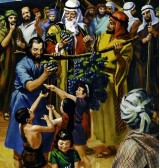 民数记第四课:蚱蜢信心:民数记十三至十四章
民数记第四课:蚱蜢信心:民数记十三至十四章
摩西是《圣经》里的重要人物之一。摩西带领以色列人从埃及吃苦之地出来前往迦南地,就是神给的应许之地。能够征服迦南地,犹太人需要强壮的信心吗?还是“蚱蜢信心”就够了?
一。民数记13:1-25:侦察迦南地:民数记13:1-3:神叫摩西作什么?(参看申命记1:22和上下文。)总共几个人?每一___派一位,但是哪个支派是个例外而没有人参与?___ ___。怎么还会有十二个人呢?民数记13:17-20:摩西打发他们去窥探迦南地的目的为何?民数记13:21-25:他们旅行几天?___天。看到什么好的没有?请举例。注意:亚衲族人个子高大。
二。民数记13:25-33:侦察者回去报告:侦察者回去作报告时,分为___个看法,是___位比___位。“大多数”的人说什么表示他们对迦南地的机会和责任?“少数”的人说什么表示他们的立场和看法?“少数”的人是谁?(参看民数记14:6)。民数记13:22, 28, 29, 32, 33:在众人的心目中,亚衲族等人越来越高大。在以色列人心目中亚衲族等人变成什么?因此,众人都很___怕,而不想去占领迦南地。在这种情况下(有人不要去占领迦南地,也有人要去),为要作很好的领袖,摩西应该选用民主的方法解决问题,对不对?意思是,如果“大多数”的人不想前往迦南地,摩西就应该听从他们,而不去,是吗?民数记13:33:“我们在那里看见亚衲族人,就是伟人,他们是伟人的___ ___。据我们看___ ___就如蚱蜢一样,据他们看我们也是如此”。此句话是夸大其词,表示众人的___ ___太小。今天,我们向神所说的话是否表示我们也只有“蚱蜢信心”(软弱不坚固的信心的意思)?
三。民数记14:1-19:众人又抱怨:“以色列众人向摩西、亚伦发怨言”说什么?嫩的儿子约书亚和耶孚尼的儿子迦勒向全会众说什么?他们说:“7 我们所窥探经过之地是___ ___之地。8 耶和华若___ ___我们,就必将我们领进那地,把地___ ___我们,那地原是流___与___之地。9 但你们不可___ ___耶和华,也不要怕那地的居民,因为他们是我们的___ ___,并且荫庇他们的已经___ ___他们。有耶和华与我们___ ___,不要___他们!” 10 约书亚和迦勒说完这么多造就人的好话以后,众人想要用___ ___ ___ ___他们。但是,耶和华的___ ___在会幕中向以色列众人___ ___。”神向摩西说什么?摩西如何反应?
四。民数记14:20-38:神惩罚二十岁以上的人:民数记14:20-23:摩西请求神,神垂听摩西而___ ___了以色列人的罪孽。但是,虽然罪得了赦免,犯罪者还是要接受犯罪的后果。是什么?
24节:迦勒和他人的不同是迦勒有另外一种___ 志;他“专___跟从”耶和华。民数记14:26-35:详细地述说神怎么样惩罚以色列人。他们将要___在旷野。谁要死在那里?他们在旷野要流浪几年?神用什么算法把此数目算出来?
35节:他们的结局会怎么样?谁决定他们的结局?在民数记十四章二节,民众摇头说“…巴不得我们早死在埃及地,或是___在这旷野”;在第32至35节,神就答应他们,让他们实现愿望。从此事件,我们今天的人应该学习什么?(参看传到书5:1-7。)民数记14:36-38:传出坏消息之人的惩罚是什么?
五。民数记14:39-45:改而不悔:请述说民众作了什么,结果如何?他们认了罪,但是在他们心里的深处,他们改变了没有?从此我们得知“热心”不够,必须有___识;必须听___神的诫命, 神才会与我们___在。
读者:欢迎您把这篇短文下载,复印,用在您的《圣经》班里。
Numbers/04: Grasshopper Faith
Numbers chapters 13-14
1. Numbers 13:1-3: Exploring Canaan: Num. 13:1-3: What did God tell Moses to do? (See Deuteronomy 1:22 and context.) How many men? One man for each t____, however, which tribe was an exception and did not send a participant? How then were there still twelve men? Num. 13:17-20: What was the purpose of sending them to spy or explore the land? Num. 13:21-25: How many days did they travel? Did they see anything worthwhile? Give examples. Note: Descendants of Anak were people of large stature.
2. Numbers 13:25-33: The Scouts Return and Report: When the men returned and reported they were of t____ viewpoints, t___ vs. t____ men. What did the majority say? What did the minority say? Name the two in the minority (Num. 14:6). Num. 13:22, 28, 29, 32, 33: In the minds of the people, the descendants of Anak and others became larger and larger [physically]. In the minds of the Israelites these people became g___, and so everyone became a___ and did not want to conquer the land. In a situation such as this (some people want to take the land and others do not), in order to be a good leader, should Moses adopt a democratic method of solving the problem? In other words, is it correct to say that if the majority does not want to go to Canaan, Moses should listen to them and not go? Num. 13:33: “We saw the Nephilim there (the d____ of Anak come from the Nephilim). We seemed like grasshoppers in o__ o__ eyes, and we looked the same to them.” This sentence is hyperbole and it indicates that their f____ was very small. Today, does what we say to God indicate that we also have “grasshopper faith”? (“Grasshopper faith” means weak faith.)
3. Numbers 14:1-19: The People Rebel Again: When “All the Israelites grumbled against Moses and Aaron,” what did the people say? What did Joshua son of Nun and Caleb son of Jephunneh say to the multitude? 7 …”The land we passed through and explored is exceedingly g____.8 If the LORD is p_____ with us, he will lead us into that land, a land flowing with m___ and h___, and will g___it to us. 9 Only do not r___ a_____ the LORD. And do not be afraid of the people of the land, because we will s_____ them up. Their protection is g__, but the LORD is w___ us. Do not be a___ of them.” 10 But the whole assembly talked about s______ them. Then the g____ of the LORD a___ at the Tent of Meeting to all the Israelites.” What did God say to Moses? How did Moses react?
4. Numbers 14:20-38: God Punishes Those Above Twenty Years Old: Num. 14:20-23: Moses asked God and God listened to Moses and f____ the sins of the Israelites. However, although their sins were forgiven, those who sinned still had to endure the result of their sins. What was it? Vs. 24: Caleb was different from others in that Caleb had a different s____; he follows [the LORD] w______.” Num. 14:26-35: Explain in detail how God punished the Israelites. They would d__ in the desert. Who would? How many years would they wander in the desert? How did God deduce this figure? Vs. 35: What would be their end? Who determined the outcome of their lives? In Numbers 14:2, the community shook their heads and said, “If only we had died in Egypt! Or [d___] in this desert!” In verses 32 and 35, God gives them what they asked for and enables them to realize their wish. What should we today learn from this incident? (See Ecclesiastes 5:1-7.) Num. 14:36-38: What punishment did those receive who brought back a bad report?
5. Numbers 14:39-45: Change But No Repentance: Tell what the people did and what result did they have. They confessed sin, but did they make any change way down in the depths of their hearts? From this we can learn that “enthusiasm” is insufficient, it must be accompanied by kn_____; we must o___ God’s commands in order for God to go w___ us.
圣经问答
民数记第四课:蚱蜢信心:民数记十三至十四章
Bible Study Questions: Numbers Lesson Four
Numbers 13-14: Grasshopper Faith
作者:谢德华 ©By Edward Short
本文所问的问题使用汉子圣经。
欢迎您把此文下载用在圣经班或私人学习。
A series of Bible lessons, written in Chinese
and based largely on the text of the Chinese Bible.
You may download and print copies of this lesson
for use in your Bible class.
World Christian Broadcasting
Franklin, TN 37067 USA
